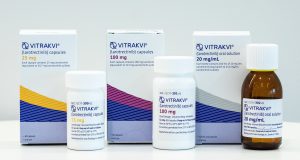With its planned $8 billion acquisition of Loxo Oncology, Eli Lilly signaled it is serious about catching up in cancer drug development by becoming a top-tier precision oncology company, according to an investor and observer of the cancer immunotherapy market.
“Eli Lilly is a big pharma company that kind of missed the boat on the cancer revolution that has happened over the last four or five years,” said Brad Loncar, CEO of Loncar Investments, who tracks developments in cancer immunotherapy and the broader biopharma industry.
“To their credit, this year, they’re being very aggressive with their checkbook to get right back into it, because it’s going to be a growth area for a decade. Money follows the science, and this is where new therapies are having the biggest impact for patients,” Loncar said. “In this day and age where payers are pushing back and drug pricing is a big issue, you have to match the right drug to the right patient, and that’s exactly what Loxo’s drugs are designed to do.”
Loxo specializes in developing treatments for cancers defined by single gene abnormalities detectable by genomic testing. Loxo partnered with Bayer to develop Vitrakvi® (larotrectinib), which won FDA approval in November as the first cancer treatment with a tumor-agnostic indication at the time of initial authorization, with approval based on mutation type rather than on where in the body the tumor originated.
Loxo’s pipeline includes LOXO-305, an oral Bruton’s tyrosine kinase (BTK) inhibitor currently in Phase I/II, and designed to address acquired resistance to currently available BTK inhibitors. Also in Loxo’s pipeline is the first-in-class oral RET inhibitor LOXO-292. Loxo has planned a potential initial launch in 2020 for LOXO-292, which is designed to target cancers with alterations to the rearranged during transfection (RET) kinase.
“This deal is a sign of the times,” Loncar said. “We talk a lot about precision medicine. This is the ultimate precision medicine in oncology company.”
Lilly said it will disclose the expected impact from its acquisition of Loxo when it releases fourth-quarter and full-year 2018 financial results on February 13.
Adding Loxo’s precision oncology treatments is Lilly’s latest move toward expanding its oncology franchise. Since chairman and CEO David A. Ricks took the company’s helm in 2017, Lilly:
- Completed an approximately $1.6 billion acquisition of Armo BioSciences, giving Lilly a Phase III pancreatic cancer candidate that is also being developed to treat other solid tumors.
- Completed its acquisition of AurKa Pharma for up to $575 million—$110 million upfront, and up to $465 million in payments tied to the Lilly-discovered Phase I oncology compound AK-01 gaining approval in the U.S. and other markets, and achieving certain sales levels.
- Appointed Leena Gandhi, MD, PhD, to lead Lilly Oncology’s immuno-oncology development efforts. She was previously director of thoracic medical oncology and an associate professor of medicine at New York University (NYU) School of Medicine.
- Also last year, Lilly launched the breast cancer treatment VerzenioTM (abemaciclib) following FDA approval. Verzenio is indicated in combination with an aromatase inhibitor as initial endocrine-based therapy to treat postmenopausal women with hormone receptor-positive (HR+), human epidermal growth factor receptor 2-negative (HER2–) advanced, or metastatic breast cancer.
- More recently in November, Lilly launched a potentially more than $40 million partnership with NextCure to discover and develop cancer targets for new immuno-oncology therapies by using NextCure’s Functional, Integrated, NextCure Discovery in Immuno Oncology (FIND-IO™) platform.


